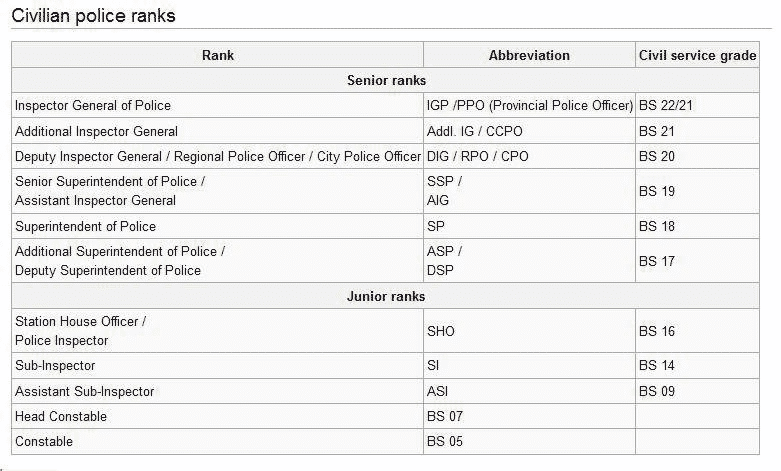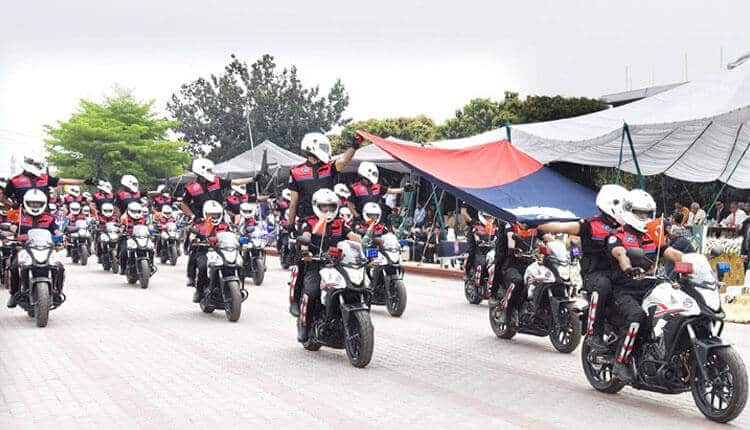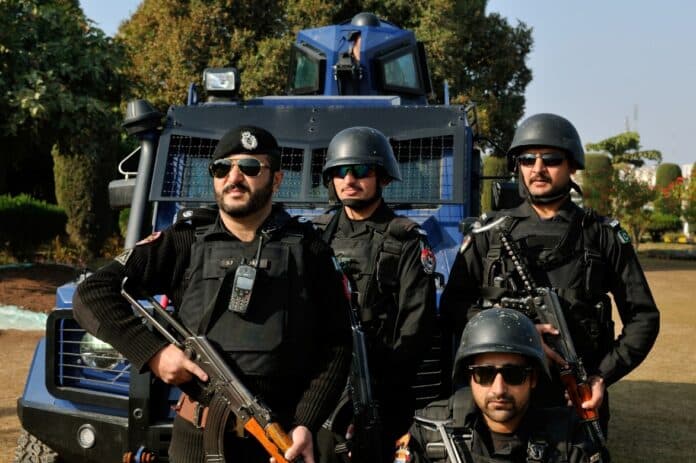The police force in Pakistan is an organized group of individuals tasked with a variety of responsibilities, including keeping peace and order, detecting and catching criminals, and gathering intelligence. Throughout this blog article, we will discuss the various ranks of the Pakistani police force, along with their duties and general pay scales, among other things.
In every city, the police are working for the safety of citizens of our dear homeland. Police department is also playing a vital role in crime investigation, anti-drug squad, and the safety of public properties, maintenance of traffic rules and regulations and many more.As we know that, the police is a very large force, they work under one another, for this purpose big department is divided into ranks. Every rank performs his own duty.
Police rank in Pakistan:
A police service is provided by each province in Pakistan. For example, the Punjab Police ranks, the KP Police ranks, the Sindh Police ranks, and the Balochistan Police ranks, are all separate entities from the federal police.
The Azad Jammu and Kashmir (AJK) Police, the Islamabad Capital Territory (ICT) Police, and the Gilgit Baltistan (GB) Police are all responsible for law enforcement in their respective jurisdictions.
As Inspector-General, each police force is headed by a Commissioner of Police, who is the most senior officer from Pakistan’s Police Service, which is a part of the Central Superior Services of Pakistan. Commissioners of Police are chosen by the President of the Republic of Pakistan.
Those certain types of law enforcement agencies exist, such as the Airports Security Force, the Anti-Narcotics Force, the Federal Investigation Agency, the Frontier Constabulary, the National Highways as well as Motorway Police, the Pakistan Coast Guard, the Pakistan Railways Police, the Pakistan Customs, the Baloch Constabulary, the Baloch Levies, the Frontier Police, the Punjab Prisons, the Police Qaumi Razakars, and the Frontier Corps, to name a few examples.
Police officer ranks:

If you want to become a member of the Pakistani Police Services, you must adhere to a strict hierarchy of requirements (PSP). The members in this hierarchy are ranked according to their level of education and expertise. When it comes to climbing the corporate ladder, there is no such thing as sheer talent or years of service.
Consequently, it should be absolutely evident that one must have higher qualifications in addition to abilities, command and mastery, as well as the ability to address challenges.
When it comes to Civil Services in Pakistan, the ranks of the army and police are nearly identical. Although they both provide services to the state, there is a significant variation in the quality of those services.
After reading today’s blog, you will be able to identify police ranks with stars with more ease in the future. You should read our blog and gain a better grasp of the police ranks in Pakistan before getting into any issue with a police officer the next time.
In order to fully participate in our journey through Pakistani police ranks, you should be familiar with the following terminology: Those are the ones;
- BSC is an abbreviation for the ‘Basic Pay Scale’ that has been established by the Government of Pakistan.
- Officers nominated by the Pakistani Government and published in the Official Gazette are referred to as Gazetted Officers.
- A division is a subdivision of a province in the United Kingdom.
- The term “District” refers to the subdivision of a Division.
- A town is a subdivision of a municipality.
In Pakistan, police ranks are classified according to the amount of qualification that an individual possesses. Senior Police Force Ranks and Junior Police Force Ranks are the two categories in which the positions are divided.

Ranks of senior police officers:
The territory of each Pakistani province is organized into regions, which are in turn subdivided into districts. Every district in Pakistan is overseen by a District Police Officer (DPO), who serves as the administrative and operational head of the police force in that district.
Police officers report to the Regional Police Officer (RPO) or the City Police Officer (CPO), who in turn reports to the Provincial Police Officer (PPO) (PPO). In Pakistan, roles such as SHO, DPO, RPO, CPO, and PPO are also positions rather than police ranks.

Assistant/Deputy Superintendent of Police (ASP/DSP)
As previously stated, each district in Pakistan is subdivided into two or more sub-divisions. Assistant or Deputy Superintendent of Police is responsible for a sub-division within a police department’s district. As gazette officers, ASPs and DSPs are classified as BPS 17 civil service officers, which is the civil service grade for this position.
A Bachelor’s degree (14 years of formal education) out of an approved university is the very minimum requirement for this position in the Pakistani military. The candidate for this role must be between the ages of 21 and 28 years old, according to the age restriction.
Superintendent of Police (SP)
An administrative office at police headquarters, the Superintendent of Police is in control of non-field operations. BPS 18 is the base pay grade for this position in the police force.
Senior Superintendent of Police (SSP)
In addition to serving as the DPO, the Senior Superintendent of Police also has a non-field position in police headquarters. In Pakistan, the civil service grade for the rank of SSP is BPS 19, which is the 19th grade in the civil service.
Deputy Inspector General of Police (DIG)
As the RPO or CPO, or as an in-charge of a non-field branch, division, or wing, the Deputy Inspector General of Police performs a variety of duties. According to the Pakistan Police, the basic pay grade for this position is BPS 20.
Additional Inspector General of Police (AIG or Addl. IG)
The Additional Inspector General is in charge of an area or a city’s administrative centre. Personnel with this rank may also be in charge of a branch, division, or wing that is not in the field. Their civil service grade is BPS 21, which stands for Business and Professional Services. The abbreviation AIG is also sometimes used to refer to Assistant Inspector General, that is the same civil service grade as that of a Special Prosecutor General.
Inspector General of Police (IGP)
The Inspector General of Police is the highest ranking officer in the Pakistani police service. An Inspector General of Police (IGP) is in charge of the provincial and administrative police establishment and also serves as the PPO. This position has a civil service grade of BPS 21 or 22, giving it a three-star appointment under the federal government.
Junior Police Force Ranks in Pakistan
As a result, police stations are divided up into different beats. Patrolling, surveillance, and information collection are among the responsibilities allocated to junior officers, such as Constables, Head Constables, and Assistant Sub-Inspectors, among others.
In districts and rural locations, the Sub-Inspector of Police (also known as the Station House Officer, or SHO) is often the person in charge of the station house. Typically, the SHO is appointed by the Inspector of Police in larger and more heavily populated districts. Furthermore, if a police station is located in an area with a high incidence of crime, the station is subdivided into police outposts.
Constable
A Constable is a member of the police department’s junior staff. The required age range for this position is between 18 and 26 years old. Constables in the police service are paid on a basic pay scale or grade ranging from BPS 5 to BPS 7.
The Matriculation diploma is the bare minimum police qualification in Pakistan for this position.
Head Constable
An officer with the rank of Head Constable is superior to an officer with the rank of constable. The basic pay scale or grade of chief constables in the Pakistani police is between BPS 7 and BPS 9, depending on experience.
Assistant Sub-Inspector of Police (ASI)
In the police station, the Assistant Sub-Inspector holds a position higher than the constable and the chief constable. This rank in the police department has a civil service grade ranging from BPS 9 to BPS 11.
Sub-Inspector of Police (SI)
The duties of a sub-inspector can include managing a small police station in a rural or suburban setting, as well as working as part of the staff in a police station in a larger city or town. Pakistani police officers who hold this rank are paid according to the Basic Pay Scale (BPS 14).
Inspector of Police (IP)
Police inspectors are selected to manage police stations and to serve as SHOs (supervisors of investigations). BPS 16 is the civil service grade assigned to this position.


